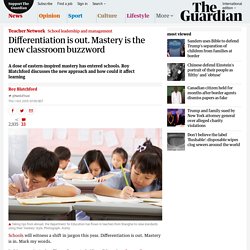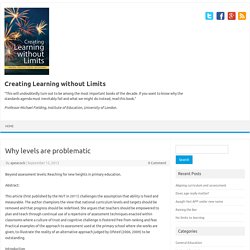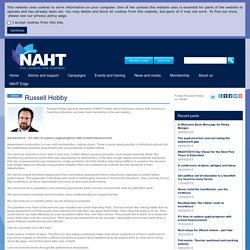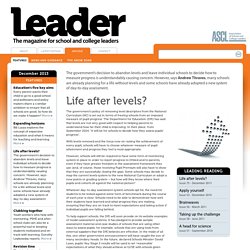

Differentiation is out. Mastery is the new classroom buzzword. Schools will witness a shift in jargon this year.

Differentiation is out. Mastery is in. Mark my words. In his memoir, An Intelligent Person’s Guide to Education, former Eton headmaster Tony Little recounts the delightful story of workmen at the school uncovering fragments of a wall painting under some wood panelling. EFA training - View Download. Mastering Mathematics : Primary: Oxford University Press.
Life after levels report calls for greater understanding between Ofsted and teachers. The long-awaited report from the government's Commission on Assessment without Levels was published today, setting out key principles that schools should use when setting up their own assessment systems.

It is a key marker for teachers, schools and ministers as they attempt to navigate assessment after the abolition of levels last year. Responding to reports that approaches to assessment are increasingly driven by expectations of what Ofsted inspectors are looking for, the government has agreed to the commission’s recommendation that headteachers and Ofsted inspectors should be jointly trained on what good systems look like and how schools can show they have them. Russell Hobby, general secretary of headteachers' union NAHT, said it was essential that heads and inspectors looked for the same things. “Many heads and teachers can design really good assessment systems that give them the information they need to know,” said Mr Hobby.
Data_driven_dialogue.pdf. Tim Oates talks about assessment without levels. Why levels are problematic. Beyond assessment levels: Reaching for new heights in primary education.

Abstract: This article (first published by the NUT in 2011) challenges the assumption that ability is fixed and measurable. The author champions the view that national curriculum levels and targets should be removed and that progress should be redefined. She argues that teachers should be empowered to plan and teach through continual use of a repertoire of assessment techniques enacted within classrooms where a culture of trust and cognitive challenge is fostered free from ranking and fear.
Practical examples of the approach to assessment used at the primary school where she works are given, to illustrate the reality of an alternative approach judged by Ofsted (2006, 2009) to be outstanding. Introduction For too long we have obediently accepted the view that progress is easily measurable through tests and that intelligence is fixed.
Primary_Review_Harlen_3-4_briefing_Quality_of_learning_-_Assessment_alternatives_071102.pdf. CLwL-Transforming-Learning-Capacity.pdf. CLwL-Increased-learning-capacity.pdf. GL Education Group International. 360° approach to student assessment webinar May 2015. NAHT It's time to replace pupil progress with school improvement. Russell Hobby, general secretary of NAHT writes about education policy, with a focus on how the profession can take back ownership of its own destiny Assessment – It’s time to replace pupil progress with school improvement Assessment in education is riven with contradiction, risking chaos.

There is some great practice in individual schools but the relationship between assessment and accountability is dysfunctional. The removal of levels is not in itself a bad idea. Levels offered spurious precision and erased essential detail. We cannot unpick formative assessment from summative assessment when schools are expected to predict future performance. We cannot move to qualitative and narrative approaches when schools must provide data to justify their work. We cannot expect creativity and innovation when professionals are trapped by fear. We cannot focus on mastery when we are driving on progress. The greatest irony here is that schools and ministers are closer than they think.
Ends. NAHT The “too abstract” levels and more abstract proposed replacement. The former TES journalist writes for NAHT on current education issues.

The views expressed do not necessarily reflect those of NAHT The “too abstract” levels system and its more abstract proposed replacement Will the proposed new national assessment system for primary schools be an improvement over the current, quarter century-old, “levels” regime or a step backwards? This is the question lingering behind last week’s much-derided, and much-delayed, announcement on the subject. (See consultation paper here: Life after levels case study webinar. Assessment Without Levels. In May 2014 we (Durrington High School) were awarded an ‘Assessment Innovation Fund’ by the DFE, to develop a method of ‘assessing without levels’ in KS3.

This page outlines how our ‘Growth & Thresholds’ method of assessment will work – and can be used by schools to get started with it themselves. Our starting point was to come up with a set of principles that guided our assessment model. We wanted an assessment system that: Is based on developing the key knowledge and skills required for success in KS4Is based on our high expected standards of studentsIs based heavily on formative feedback and allows all students to succeed – and so develops a growth mindsetIncorporates periodic summative assessment to support this ongoing formative feedbackIs simple and easy to understand – for staff, parents and students.Has consistent principles, to be used across subjects, but the flexibility to be suitable for all subjects.
In summary: So how does it work…..? The new GCSE grades explained: Resources. Life after Levels. Helping your school build a new assessment framework The Government’s decision to remove levels and leave individual schools to decide how to measure progress understandably is causing concern for many schools, particularly at a time of other major changes in education, including the introduction of a new National Curriculum.

However, many schools are already planning for a life without levels, with some schools having adopted a new system of day-to-day assessment. Throughout this section, we explore what the new policy means, the emphasis on assessment and how you can tackle the challenges ahead with a range of tried and tested assessments and services. Our assessment model To build a truly holistic view of each pupil, it is necessary to look at measurements of ability and attitudes alongside a pupil’s attainment. The removal of levels explained Using standardised assessments Download our short guide to standardised tests. SECONDARY_national_curriculum.pdf. Beyond-levels-national-curriculum-assessment-outcomes-and-impact.pdf. Beyond-levels-alternative-assessment-approaches-developed-by-teaching-schools.pdf. How good is our current curriculum? The_framework_for_school_inspection.pdf. Articles > Life after levels? - Leader Magazine. The government’s policy of removing level descriptors from the National Curriculum (NC) is set out in terms of freeing schools from an imposed measure of pupil progress.

The Department for Education (DfE) has said that levels are not very good with respect to helping parents to understand how far their child is improving. In their place, from September 2014, “it will be for schools to decide how they assess pupils’ progress”.